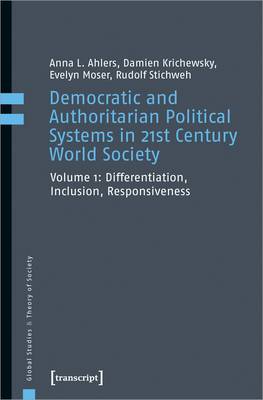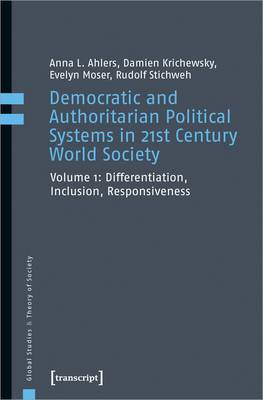
- Afhalen na 1 uur in een winkel met voorraad
- Gratis thuislevering in België vanaf € 30
- Ruim aanbod met 7 miljoen producten
- Afhalen na 1 uur in een winkel met voorraad
- Gratis thuislevering in België vanaf € 30
- Ruim aanbod met 7 miljoen producten
Zoeken
Democratic and Authoritarian Political Systems in 21st Century World Society
Differentiation, Inclusion, Responsiveness
Anna L. Ahlers, Damien Krichewsky, Evelyn Moser, Rudolf Stichweh
€ 50,95
+ 101 punten
Omschrijving
What seemed unthinkable after the end of the Cold War and the triumph of liberalism has become reality today: the democratic world society of the 21st century is threatened by illiberal and autocratic political models. The state is no longer an instrument of a dominating stratum trying to control society. It must include individuals, produce valued outputs, know the complexity of society, and accept or deny the autonomy of other specialized function-systems. The authors analyze these political systems of a functionally differentiated world society and argue that they are completely novel because they incessantly adapt to the process of functional differentiation. To this end, they define structural core characteristics of modern policy, such as the political inclusion of everyone as a reaction to individualism; the complexity of polities arising from internal differentiation; and the increasing political decision-making handed to experts and autonomous organizations.
Specificaties
Betrokkenen
- Auteur(s):
- Uitgeverij:
Inhoud
- Aantal bladzijden:
- 250
- Taal:
- Engels
- Reeks:
Eigenschappen
- Productcode (EAN):
- 9783837651263
- Verschijningsdatum:
- 30/01/2021
- Uitvoering:
- Paperback
- Formaat:
- Trade paperback (VS)
- Afmetingen:
- 152 mm x 229 mm
- Gewicht:
- 335 g

Alleen bij Standaard Boekhandel
+ 101 punten op je klantenkaart van Standaard Boekhandel
Beoordelingen
We publiceren alleen reviews die voldoen aan de voorwaarden voor reviews. Bekijk onze voorwaarden voor reviews.








